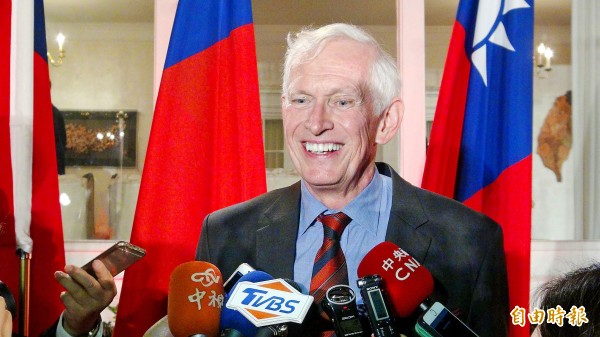《TAIPEI TIMES》 US urges constructive cross-strait talks

American Institute in Taiwan Chairman James Moriarty talks to reporters at the Twin Oaks estate in Washington on Wednesday. Photo: CNA
STRIKING A BALANCE: Incumbent and former AIT officials said President Tsai Ing-wen’s National Day speech shows her commitment to a pragmatic cross-strait policy
/ Staff writer, with CNA
The US Department of State on Wednesday urged Taiwan and China to engage in constructive dialogue and seek a peaceful resolution to their differences.
A spokesperson at the State Department made the statement in response to the Double Ten National Day address by President Tsai Ing-wen (蔡英文), in which she identified China’s diplomatic offensive and military coercion as a serious challenge to cross-strait peace and stability.
The US has a deep and abiding interest in cross-strait peace and stability and it is important that both sides of the Taiwan Strait understand the significance of related benefits and work to establish a basis for continued peace and stability, the spokesperson said.
“We encourage authorities in Beijing and Taipei to engage in constructive dialogue that seeks a peaceful resolution of differences acceptable to the people of both sides of the Taiwan Strait,” the spokesperson said.
The spokesperson also quoted remarks made by US Vice President Mike Pence last week that while the US would “continue to respect the US’ ‘one China’ policy, as reflected in the three joint communiques and the Taiwan Relations Act, America will always believe Taiwan’s embrace of democracy shows a better path for all the Chinese people.”
In her speech, Tsai said China’s unilateral diplomatic offensive and military coercion have not only harmed cross-strait relations, but also seriously challenged the “status quo” of peace and stability in the Taiwan Strait.
Tsai said that the more dramatically things change, the more Taiwan has to maintain stability, remain composed to reduce pressure and calmly find its survival niche.
American Institute in Taiwan (AIT) Chairman James Moriarty said the most significant aspect of Tsai’s address was her commitment to a pragmatic and peaceful cross-strait policy.
Tsai tried to strike a very positive and yet reserved tone, a tone that could open doors, but yet indicated that Taiwan would stick to its principles, he said.
“Here is a call all the time for a constructive, creative and flexible approach” to cross-strait relations, he told reporters at a party in Washington to celebrate Double Ten National Day.
Moriarty said the US wants to see dialogue between the two sides of the Taiwan Strait and he thinks Tsai on her side is trying to do that.
“I have not seen much response yet from the other side,” he said. “I have not seen the creative, flexible [approach] that all we would like to see.”
He suggested that in a bid to facilitate or initiate dialogue with China, Taiwan should keep the door open and try to make it clear that it would welcome constructive talks.
“If we leave the door open, at some point perhaps China would be willing to go through it and start constructive dialogue,” he said, but added that neither Taiwan nor the US could predict China’s reaction.
Former AIT chairman Richard Bush said that Tsai’s remarks reflected the complex situation she is in concerning cross-strait relations, with China pushing on one side and Taiwanese political forces on the other.
“Her approach has been to try to balance these two, and her remarks reflect a continuation of that approach,” Bush said, adding that he believes the US government appreciates Tsai’s moderate and balanced approach.
Tsai’s address summarized a sensible approach not to try to exploit enhanced tensions between Washington and Beijing, which he said historically tend to inflict damage on Taipei more than the other two, former AIT director Douglas Paal said
Paal also described a possible effort outlined by Tsai to exploit opportunities in the changing supply chain world as “smart.”
新聞來源:TAIPEI TIMES




















